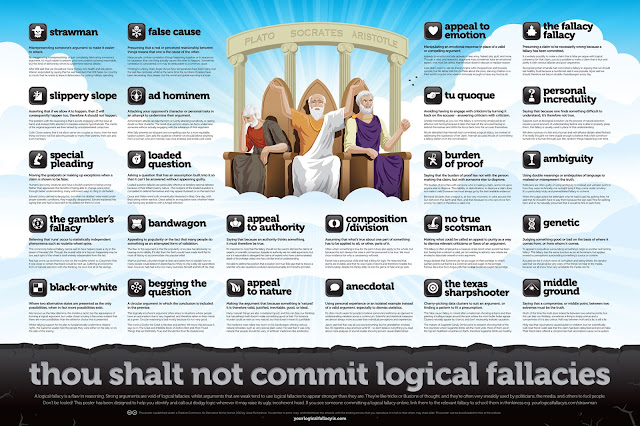Continuing with the series, Purity of Mind and Heart:
#1: Use reason to clarify your worldview, when making major decisions, and in opposing what is false, wrong, and destructive.
Steer clear of informal and logical fallacies.
#2 Keep in mind that sometimes the term fallacy can even be used as a fallacy! For example, it has often happened in “appeal to authority.” An individual states 98% of plumbers in the U.S. think that such and such pipe is more reliable than…Or most philosophers think that…
And a person who disagrees says, “Oh, that’s just an appeal to authority—Fallacy!"
Nope. Showing that most authorities in their field support a view--the consensus--isn’t a fallacy, that’s evidence.
The fallacy, “appeal to authority” is when you argue most ministers, or most people in the U.S., believe that evolution is false. That is an error in authority because whether or not evolution is true or false is a subject for biologists to study and present evidence for one way or the other (97% of scientists say evolution is a fact).
Whether or not not most ministers, or most of the public, oppose evolution as false is not significant because they aren't scientists!
#3 Though carefully thought out reasoning is the watch-word, It’s okay, (even sometimes needed or necessary), to make intuitive jumps. Scientists and other thinkers often use intuition including famous ones such as Albert Einstein. Remember his comment about how imagination is more important than knowledge.
When making intuitive leaps, however, make sure it’s not near a cliff;-).
If you’ve been studying a project or issue in depth and haven’t solved the problem, then taking a break, even sleeping on it may help. One scientist actually made an important discovery in a dream.
However, if you are about to try out a new parachute, launch a rocket, get married, or change worldviews, it behooves you to double check your sudden intuitive insight with some careful thinking and evidence.
#4 When thinking through an ethical problem, be careful about semantic confusion, simplistic terms, and confirmation bias. Take a look at Peanuts:
And consider another example of confirmation bias, semantic confusion, and simplistic term-iteness:
"I'm pro-life! Strongly against abortion. We stand with America and our troops. Remember what our Christian leader said, God's gift to America
is the atom bomb."
Huh?
In the Light of Reason,
Daniel Wilcox



No comments:
Post a Comment